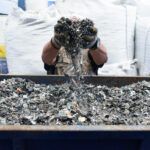MIT says Trump misused its research in ditching climate deal
By Dan Drollette Jr | June 7, 2017
The Massachusetts Institute of Technology (MIT) says that President Trump badly misrepresented the research of its scientists when he cited their work last Thursday to justify his withdrawal from the Paris Agreement, reported the Reuters news service.
Trump had said: “Even if the Paris Agreement were implemented in full—with total compliance from all nations—it is estimated it would only produce a two-tenths of one degree Celsius reduction in global temperature by the year 2100… Tiny, tiny amount.”
The problem is threefold. For one thing, Trump was comparing apples and oranges. The 0.2 degree figure he cited was actually comparing the impact of the Paris Agreement to an earlier attempt at an agreement on climate change in Copenhagen a few years earlier. In other words, Paris had inched the world 0.2 degrees closer to the ultimate target than Copenhagen.
For another, Trump’s team had cherry-picked the evidence, looking for the lowest number they could find—no matter if it was applicable or not—among the studies that explored the impact of the climate accord, said Erwan Monier, co-author of the study and principal research scientist at MIT’s department of Earth, Atmospheric, and Planetary Sciences.
Finally, Trump had misstated the researchers’ ultimate conclusions. “This idea that the Paris Agreement has a negligible impact on future climate change is certainly not what we conveyed and was not the conclusion of our analysis,” Monier said.
The university supported the researchers’ contention, in a statement released on Friday: “The relevant MIT researchers believe that the Paris Agreement is an unprecedented and vital effort by nearly 200 countries to respond to the urgent threat of global climate change.”
The study in question, published in 2015 and titled “Energy and Climate Outlook” showed that if countries abided by their pledges, global warming would indeed diminish enough to greatly slow down a good number—though by no means all—of the most harmful effects of climate change. And more effort would still need to be made.
Publication Name: Reuters
To read what we're reading, click here
Together, we make the world safer.
The Bulletin elevates expert voices above the noise. But as an independent nonprofit organization, our operations depend on the support of readers like you. Help us continue to deliver quality journalism that holds leaders accountable. Your support of our work at any level is important. In return, we promise our coverage will be understandable, influential, vigilant, solution-oriented, and fair-minded. Together we can make a difference.
Topics: Climate Change, What We’re Reading















